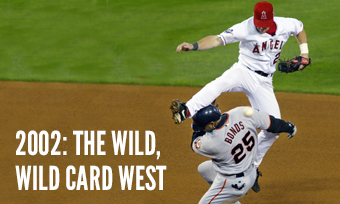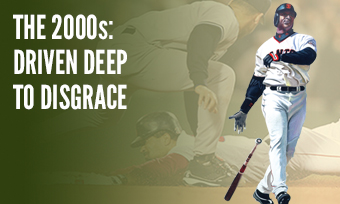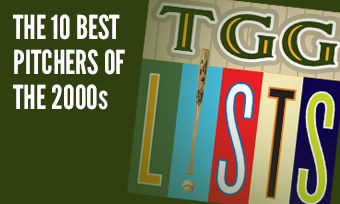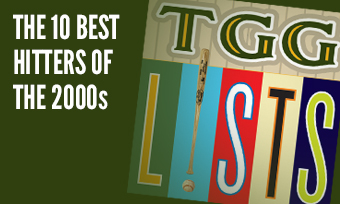The Yearly Reader
Leaders and Honors, 2002
Our list of baseball’s top 10 hitters and pitchers in both the American League and National League for the 2002 baseball season, as well as the awards and honors given to the game’s top achievers of the year.
The National League’s Top 10 Hitters, 2002
Bold type in brick red indicates league leader.
1. Barry Bonds, San Francisco
Key Numbers: .370 average, 117 runs, 31 doubles, 46 home runs, 110 RBIs, 198 walks, 68 intentional walks, .582 on-base percentage, .799 slugging percentage.
Pitchers avoided Bonds like the plague as never before, even as the 38-year-old slugger was hounded for part of the year by groin problems.
2. Todd Helton, Colorado
Key Numbers: .329 average, 107 runs, 182 hits, 39 doubles, 30 home runs, 109 RBIs, 99 walks, 21 intentional walks.
Like most Rockies stars, Helton was Superman at home (.378 average, 18 homers, 65 RBIs) and ‘very good baseball player’ on the road (.281-12-44).
3. Brian Giles, Pittsburgh
Key Numbers: .298 average, 95 runs, 37 doubles, 5 triples, 38 home runs, 105 RBIs, 135 walks, 24 intentional walks, 15 stolen bases.
Giles collected all but nine of his home runs against NL Central competition—over just 85 games.
4. Vladimir Guerrero, Montreal
Key Numbers: .336 average, 106 runs, 206 hits, 37 doubles 39 home runs, 111 RBIs, 84 walks, 32 intentional walks, 40 stolen bases, 20 caught stealing, 20 grounded into double plays.
In his last year with the Expos, Guerrero continued to be the biggest draw for what few Montreal fans still showed up.
5. Lance Berkman, Houston
Key Numbers: .292 average, 106 runs, 35 doubles, 42 home runs, 128 RBIs, 107 walks, 20 intentional walks.
As established Astros stars Jeff Bagwell (34) and Craig Biggio (36) started to wane, the Big Puma took over as the Big Guy in the Houston lineup.
6. Albert Pujols, St. Louis
Key Numbers: .314 average, 118 runs, 185 hits, 40 doubles, 34 home runs, 127 RBIs, 20 grounded into double plays.
Pujols showed that his rookie numbers the year before were no fluke; in fact, his 2002 “slash numbers” (.314/.394/.561, bat average/on-base/slugging), were all his lowest of the 2000s.
7. Sammy Sosa, Chicago
Key Numbers: .288 average, 122 runs, 49 home runs, 108 RBIs, 103 walks.
Sosa’s three homers—along with a career-high nine RBIs—on August 10 at Colorado gave him six career hat tricks, tying Johnny Mize for the all-time record.
8. Larry Walker, Colorado
Key Numbers: 136 games, .338 average, 95 runs, 161 hits, 40 doubles, 26 home runs, 104 RBIs.
Though his omni-potent numbers were starting to thin out at age 35, Walker was still prone to big-time bursts of output; over a 38-game period in June/July, he hit a whopping .435 with 11 homers.
9. Bobby Abreu, Philadelphia
Key Numbers: .308 average, 102 runs, 176 hits, 50 doubles, 6 triples, 20 home runs, 85 RBIs, 104 walks, 31 stolen bases.
Even though the left-handed-hitting Abreu hit a solid .305 against southpaws, all 20 of his home runs came against righties. That’s 113 out of 117 hit-to-date against right-handers.
10. Chipper Jones, Atlanta
Key Numbers: .327 average, 90 runs, 179 hits, 35 doubles, 26 home runs, 100 RBIs, 107 walks, 23 intentional walks.
Jones’ batting numbers were unaffected by a move from third base to left field to make room for former Rockie Vinny Castilla (who bombed).
The American League’s Top 10 Hitters, 2002
1. Alex Rodriguez, Texas
Key Numbers: 162 games, .300 average, 125 runs, 187 hits, 27 doubles, 57 home runs, 142 RBIs, 87 walks, 10 hit-by-pitches.
Rodriguez remained Barry Bonds’ AL equal as the sure thing at the plate, but MVP votes for the last-place Rangers’ shortstop were harder to come by.
2. Jason Giambi, New York
Key Numbers: .314 average, 120 runs, 176 hits, 34 doubles, 41 home runs, 122 RBIs, 109 walks, 15 hit-by-pitches.
If you can’t beat ’em, join ’em: Giambi took his power show to a Yankees team that ousted his former mates at Oakland from the postseason the previous two years.
3. Jim Thome, Cleveland
Key Numbers: .304 average, 101 runs, 52 home runs, 118 RBIs, 122 walks, .677 slugging percentage.
In his last year with the Indians before moving on to Philadelphia, Thome saved his most prodigious power display for last at the Jake—smashing a career-high 52 homers, 30 of them at home with a .350 average.
4. Magglio Ordonez, Chicago
Key Numbers: .320 average, 116 runs, 189 hits, 47 doubles, 38 home runs, 135 RBIs, 21 grounded into double plays.
The Venezuelan-born Ordonez became the second White Sock (after teammate Frank Thomas) to hit at least .300 with 30-plus homers and 100-plus RBIs in four straight seasons.
5. Alfonso Soriano, New York
Key Numbers: .300 average, 696 at-bats, 128 runs, 209 hits, 51 doubles, 39 home runs, 102 RBIs, 13 hit-by-pitches, 41 stolen bases.
The breakout second baseman was anything but the prototypical leadoff man; he walked only 23 times in 741 plate appearances and set a record for most home runs while hitting first. Soriano had 12 games to become the latest 40-40 man but failed to hit his 40th homer. (In 2006, he would make good on a second shot at 40-40.)
6. Manny Ramirez, Boston
Key Numbers: 120 games, .349 average, 84 runs, 31 doubles, 31 home runs, 107 RBIs, 73 walks, .450 on-base percentage.
A late surge gave Manny his first and only career batting crown, overcoming challenger Mike Sweeney of the Royals in the last week to nail it down.
7. Bernie Williams, New York
Key Numbers: .333 average, 102 runs, 204 hits, 37 doubles, 19 home runs, 102 RBIs, 83 walks, 20 grounded into double plays.
Opponents “felt the Bern” Yankee-style one last time as Williams’ reign at the top ended with his eighth straight year hitting over .300, and his seventh straight scoring at least 100 runs. He would hit only .263 over the next four years as he faded into his late 30s.
8. Carlos Delgado, Toronto
Key Numbers: .277 average, 103 runs, 34 doubles, 33 home runs, 108 RBIs, 102 walks, 13 hit-by-pitches.
His star buried in a time of anonymity in Toronto, Delgado made noise with more than his bat by doing more than his bit to contribute to the community—protesting the American military’s use of land in his native Puerto Rico for target practice.
9. Rafael Palmeiro, Texas
Key Numbers: .273 average, 99 runs, 34 doubles, 43 home runs, 105 RBIs, 104 walks.
Palmeiro grouped with Alex Rodriguez to become the fifth pair of teammates to combine for 100 home runs—a year after they belted 99 together.
10. Miguel Tejada, Oakland
Key Numbers: 162 games, .308 average, 662 at-bats, 108 runs, 204 hits, 30 doubles, 34 home runs, 131 RBIs, 11 hit-by-pitches, 21 grounded into double plays.
Tejada more than admirably filled Jason Giambi’s shoes at Oakland and gave the AL yet one more A-list shortstop—and the A’s their second MVP since Giambi, two years earlier.
The National League’s Top 10 Pitchers, 2002
1. Randy Johnson, Arizona
Key Numbers: 2.32 ERA, 24 wins, 5 losses, .828 win percentage, 35 starts, 8 complete games, 4 shutouts, 260 innings, 334 strikeouts, 13 hit-by-pitches, 19 stolen bases allowed, 18 caught stealing/picked off.
With a career-high win total, Johnson capped his remarkable four-year run for the Diamondbacks that included three ERA titles, 1,417 strikeouts, and four straight Cy Young Awards—making him the second player after Greg Maddux (1992-95) to achieve that.
2. Curt Schilling, Arizona
Key Numbers: 3.23 ERA, 23 wins, 7 losses, .767 win percentage, 35 starts, 259.1 innings, 33 walks, 316 strikeouts.
Schilling grouped with Johnson to become the first pair of teammates in major league history to each strike out over 300 batters.
3. Odalis Perez, Los Angeles
Key Numbers: 3.00 ERA, 15 wins, 10 losses, 32 starts, 222.1 innings, 38 walks, 17 stolen bases allowed, 18 caught stealing/picked off.
Snagged from Atlanta in the trade that sent Gary Sheffield to the Braves, Perez liberated himself from three years of frustration—highlighting the year with two one-hitters, near no-no’s that were broken up in the fifth and seventh innings.
4. Roy Oswalt, Houston
Key Numbers: 3.01 ERA, 19 wins, 9 losses, .679 win percentage, 34 starts, 233 innings, 22 grounded into double plays.
With a 2.70 home ERA, Oswalt became the first Astros hurler to conquer the quirks of cozy Minute Maid Park.
5. Eric Gagne, Los Angeles
Key Numbers: 1.97 ERA, 4 wins, 1 loss, 52 saves, 4 blown saves, 77 appearances, 82.1 innings, 16 walks.
A very peculiar presence clad in goggles and goatee, Gagne mixed a sizzling (and, later revealed, steroid-fueled) fastball with a deadly change-up to become an instant world-class closer after three years as a struggling starter.
6. Greg Maddux, Atlanta
Key Numbers: 2.62 ERA, 16 wins, 6 losses, .727 win percentage, 34 starts, 199.1 innings, 45 walks, 24 stolen bases allowed, 24 grounded into double plays.
The Braves seemed to be using a preservation society for the benefit of the 36-year-old ace, who pitched into the seventh inning in only 10 of his 34 starts; mortality would follow as Maddux’ ERA would slip into the 4.00 range starting in 2003.
7. John Smoltz, Atlanta
Key Numbers: 3.26 ERA, 3 wins, 2 losses, 55 saves, 4 blown saves, 75 appearances, 80.1 innings, 9 grounded into double plays.
The once-venerable starter Smoltz, rebounding from Tommy John surgery, was converted to closer and racked up saves with such ease, he broke the NL record.
8. Byung-Hyun-Kim, Arizona
Key Numbers: 2.04 ERA, 8 wins, 3 losses, 36 saves, 6 blown saves, 72 appearances, 84 innings.
Kim’s 2002 performance proved that he had overcome the stigma of blowing back-to-back games for the Diamondbacks in the 2001 World Series.
9. Kevin Millwood, Atlanta
Key Numbers: 3.24 ERA, 18 wins, 8 losses, .692 win percentage, 34 starts, 217 innings, 21 stolen bases allowed, 20 grounded into double plays.
Millwood won 15 of his last 18 decisions after a lackluster start and a chat with a sports psychologist; he was going to need him again after the season when the Braves, looking to dump salary, traded him one-up to the Phillies for unproven back-up catcher Johnny Estrada.
10. Robb Nen, San Francisco
Key Numbers: 2.20 ERA, 6 wins, 2 losses, 43 saves, 8 blown saves, 68 appearances, 73.2 innings.
Pitching on pain and fumes, the 32-year-old Nen toiled through the year with a partially-torn rotator cuff, underwent a series of surgeries to repair it after the season—and never returned to the majors, despite vigorous rehab.
The American League’s Top 10 Pitchers, 2002
1. Derek Lowe, Boston
Key Numbers: 2.59 ERA, 21 wins, 8 losses, .724 win percentage, 32 starts, 219.2 innings, 48 walks, 12 hit-by-pitches, 28 grounded into double plays.
Two years after leading the AL in saves, Lowe made an impressive switch from the bullpen to the rotation and gave the Red Sox a solid 1-2 punch with Pedro Martinez.
2. Pedro Martinez, Boston
Key Numbers: 2.26 ERA, 20 wins, 4 losses, .833 win percentage, 30 starts, 199.1 innings, 40 walks, 239 strikeouts, 15 hit-by-pitches.
Bouncing back from an injury-halved 2001, Martinez ran up a career-best streak of 35.1 straight scoreless frames while becoming the first pitcher since Bob Grim (in 1954) to record 20 wins on less than 200 innings.
3. Barry Zito, Oakland
Key Numbers: 2.73 ERA, 23 wins, 5 losses, .821 win percentage, 35 starts, 229.1 innings, 10 stolen bases allowed, 13 caught stealing/picked off.
The final piece of the A’s Big Three puzzle, Zito became the Cy Guy in Oaktown with a devastating curve ball.
4. Roy Halladay, Toronto
Key Numbers: 2.94 ERA, 19 wins, 7 losses, .731 win percentage, 34 starts, 239.1 innings, 21 stolen bases allowed, 24 grounded into double plays.
With a near no-hitter in his first-ever start in 1998, a 10.64 ERA in 2000 and a Class-A assignment in 2001, Halladay rebounded and emerged as the rock of the Toronto staff.
5. Billy Koch, Oakland
Key Numbers: 3.27 ERA, 11 wins, 4 losses, 44 saves, 6 blown saves, 84 appearances, 93.2 innings.
What Oakland’s Big Three—Barry Zito, Tim Hudson and Mark Mulder—couldn’t finish, Koch often could. But he sure worked hard to do it; not only did he lead the league in appearances, he also averaged a career-high 17 pitches per inning.
6. Tim Hudson, Oakland
Key Numbers: 2.98 ERA, 15 wins, 9 losses, 34 starts, 238.1 innings, 35 grounded into double plays.
After a 7-9 start, Hudson won his last eight starts to keep alive a streak of seven straight seasons to begin his career with single-digit loss totals.
7. Tim Wakefield, Boston
Key Numbers: 2.81 ERA, 11 wins, 5 losses, 3 saves, 2 blown saves, 45 appearances, 15 starts, 163.1 innings, 21 stolen bases allowed.
The resilient knuckleballer, who even at age 36 was nowhere near ready to hang ‘em up, was promoted back to the rotation late in the year and won eight games down the stretch.
8. Jarrod Washburn, Anaheim
Key Numbers: 3.15 ERA, 18 wins, 6 losses, .750 win percentage, 32 starts, 206 innings.
Where the Rally Monkey wasn’t—on the road—Washburn was, winning 13 of his 18 games outside of Anaheim.
9. Mark Mulder, Oakland
Key Numbers: 3.47 ERA, 19 wins, 7 losses, .731 win percentage, 30 starts, 207.1 innings, 11 hit-by-pitches, 7 stolen bases allowed, 14 caught stealing/picked off.
Mulder’s continued star turn was just yet another reminder to anyone who saw Moneyball that the 2002 A’s were hardly a collection of rejuvenated rejects.
10. Troy Percival, Anaheim
Key Numbers: 1.93 ERA, 4 wins, 1 loss, 40 saves, 4 blown saves, 58 appearances, 56.1 innings.
The veteran Angels closer certainly embraced the Rally Monkey; he won all four of his games, blew just one save, and posted a 1.56 ERA at Angel Stadium.









